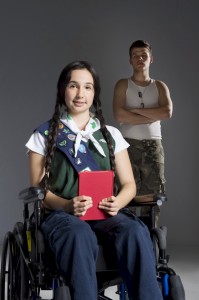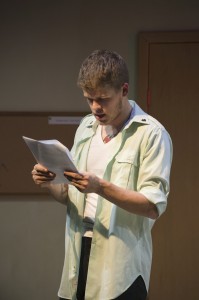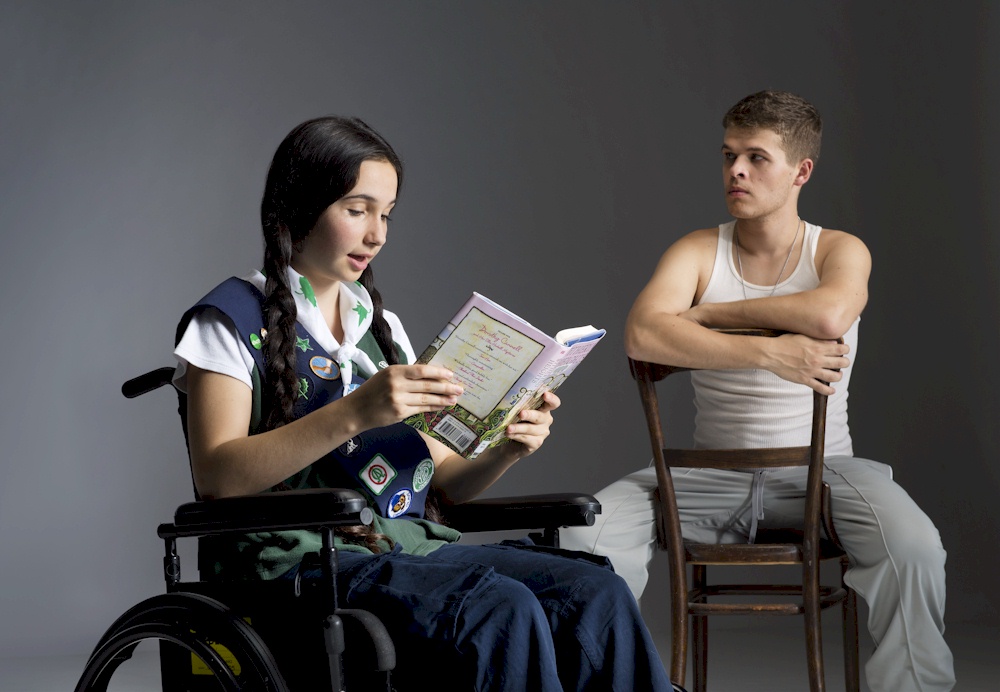
Credit: David Cooper
At the Arts Club Revue Stage until November 9, 2013
604-687-1644/www.artsclub.com
Posted October 26, 2013
This script by Colleen Murphy, enjoying its premiere production at the Arts Club Revue Stage, is an excellent vehicle for a couple of young performers. Fourteen-year-old Matreya Scarrwener makes her stage debut as 12-year-old Halley, a volunteer reader in a rehab centre for young PTSD-suffering soldier Michael (Mik Byskov). Scarrwener is near enough in age to Halley to remember and faithfully reproduce the enthusiastic gushing, the overload of feeling, the youthful optimism of adolescence – in spite of Halley being confined to a wheelchair due to a spinal cord injury; Lucy Maud Montgomery couldn’t have written her any spunkier. It’s undeniably an impressive first performance and Scarrwener gets Brownie points for portraying with such honesty and fidelity her character’s unwavering determination to earn her Pathfinder badge for community service.
A recent graduate of U. Vic’s acting program, Byskov makes his Vancouver stage debut in Armstrong’s War, too. As a wounded Afghanistan war hero, Byskov is initially intense, angry and in denial about his mental state. What Michael does not need is a terminally chirpy, cheerful kid in pigtails reading teenaged mysteries or Wuthering Heights to him.
It takes only a few minutes – even less – to know that by curtain these two will make a difference in each other’s life. More than that, we know without a doubt that her zest for living will heal him. There will be some surprises along the way but we know where this script is going.

Credit: David Cooper
After Halley gets advice from the school librarian as to what sort of book Michael might prefer, there are long sessions of Scarrwener reading from The Red Badge of Courage; the plot goes nowhere as Halley relentlessly emotes over Stephen Crane’s novel. Amazingly, unbelievably, Michael gets hooked on this book.
Under Mindy Parfitt’s direction – her Arts Club directorial debut – Scarrwener and Byskov work this script well but for a very long time, Armstrong’s War feels like TYA – theatre for young audience. While we’re charmed by Halley’s perkiness and understand the irritation she feels at the constant phonecalls from her over-anxious mother, I found it hard to invest a whole lot in a character so young.
Playwright Murphy does build an arc but so slowly: Halley arrives, reads, leaves; Halley arrives, reads, a little progress is made opening Michael up, she leaves; Halley arrives, reads, etcetera.
Two stumbling blocks prevented me from complete satisfaction: I have no idea why a soldier who has been wounded, gone through hell and who confesses that the Afghanis don’t want him there in the first place, would be so keen to suit up and go back. Is that supposed to be where The Red Badge of Courage takes him? And, a firm believer in the right to die, I’m not persuaded by the opinion of a 12-year-old who thinks Michael’s best friend – blown to bloody bits – is still better alive than dead.
“Stand tall”, “I try not to look back. I try to look ahead”, “Let’s just stop having wars, eh?” and ‘I remain unvanquished” – all spoken by Halley – are wonderful maxims to live by but life is much more complicated.
Perhaps Armstrong’s War could have ended on a slightly less ‘heroic’ note; perhaps the playwright and the director could have left us with a greater sense of why Michael, now standing tall in his uniform and medals, feels compelled to risk coming to the same end as his friend Robbie. Michael learns to let go of the past but remaining ‘unvanquished’ may be difficult with IEDs planted along the Afghanistan roadsides. Does going back to the war show courage or craziness? Will the next body bag be Michael’s?
Impressive performances; troublesome script.

Credit: David Cooper

